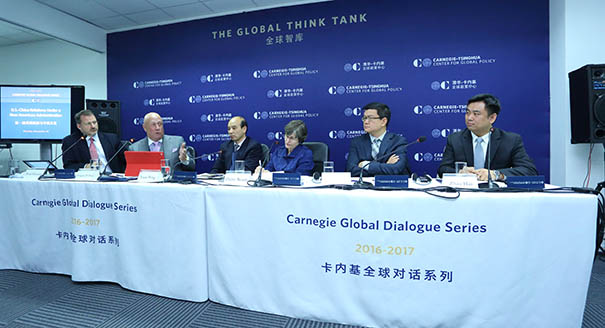Registration
You will receive an email confirming your registration.
The 2016 U.S. presidential election has exposed deep divisions among Americans, including on the country’s economic and security policies abroad. Donald Trump’s suggestions about American disengagement from Asia have caused many U.S. allies and partners to question the U.S. commitment in the region moving forward. Meanwhile, as President Obama finishes his final term in office and the president-elect assembles his incoming administration, the world is watching to see what policies the new administration will pursue, especially as they relate to one of the most important bilateral relationships: that between China and the United States.
The new administration is likely to face early tests in the Asia-Pacific, such as the urgent threat posed by the development of North Korea’s nuclear program, as well as long-term challenges posed by enduring security issues like the maritime disputes in the South China Sea, which will need to be managed. At the same time, the administration will need to find ways to capitalize on the shared opportunities presented in this vibrant region, including on economic policy and trade. This panel addressed how the United States can work with China in the coming years to manage frictions and work together in areas of common interest.
This panel was the first in the Carnegie Global Dialogue Series 2016-2017 and was cosponsored by the China Institutes of Contemporary International Relations.
Discussion Highlights
- Unexpected Victory: President-elect Donald Trump’s electoral victory was met with shock and disbelief around the world. One panelist noted that it was the most sweeping victory from the opposition party in the United States since 1928. However, another panelist argued that the outcome was not completely unexpected in light of Brexit. The discussant continued, saying that the challenge for the United States going forward will primarily be managing its own domestic affairs. Nevertheless, another panelist remarked that the election remains a deeply polarizing one that has left most commentators, including Chinese analysts, uncertain of what policies the new administration will pursue.
- An Unpredictable Leader: The challenge for China going forward will be trying to understand Trump because he is new to the political arena, one discussant said. It will be difficult for China to predict what Trump’s next move will be, discussants argued, in the absence of more information regarding who will be selected as the president-elect’s closest advisers and how he will reconcile the internal contradictions in his campaign promises. While a panelist pointed to Trump’s business background as an indicator of his perspective on international relations and alliances, the discussant said the lack of a clear agenda remains an impediment to fruitful discussions between leaders.
- Is Trump Good or Bad for China?: The panelists agreed that Chinese analysts have become more and more convinced that a Trump presidency would be more beneficial for China than a Clinton administration. Some panelists listed the divisiveness of the Trump presidency at home and his isolationist rhetoric as indicators that a Trump administration will be less inclined to become involved with Chinese regional interests. However, this view was challenged by other panelists, who saw Trump’s rhetoric regarding China as an indication that the president-elect will adopt a more assertive policy of containment vis-à-vis China, especially in such areas as human rights and trade deals, and an increased military presence in the Asia-Pacific.
- A Dangerous Gap in Expectations: The recent tendency for Chinese analysts to associate a Trump presidency with the United States drawing inwards is likely to create a dangerous gap between China’s expectations and the realities of the new administration, one panelist warned. While another panelist remarked that a single U.S. president cannot rewrite the rules of major power relations, a great deal of uncertainty comes from the uncertainty of not knowing how a potential clash between Chinese and U.S. interests will be managed.
- Taking a More Proactive Role: One panelist said that this is a golden opportunity for China to take the initiative in its relationship with the United States and that China has a lot to offer during this period of uncertainty. Indeed, the panelist added that many of Trump’s interests at home and abroad—infrastructure development and revitalizing the economy—are not inimical to China’s interests but could complement some of the new administration’s goals. However, another panelist argued that the success of these bilateral meetings will heavily depend on the personalities of President Xi Jinping and President-elect Trump, which further increases the amount of uncertainty facing the future of U.S.-China relations.
Paul Haenle
Paul Haenle is the director of the Carnegie–Tsinghua Center for Global Policy based at Tsinghua University in Beijing. Haenle’s research focuses on Chinese foreign policy and U.S.-China relations.
Douglas H. Paal
Douglas H. Paal is vice president for studies at the Carnegie Endowment for International Peace. He previously served as vice chairman of JPMorgan Chase International (2006-2008) and was an unofficial U.S. representative to Taiwan as director of the American Institute in Taiwan (2002-2006).
Yuan Peng
Yuan Peng, a research professor and doctoral adviser, is vice president of the China Institutes of Contemporary International Relations (CICIR). His research focuses on American studies, Sino-U.S. relations, Asia-Pacific security, and China’s foreign policy.
Claire Reade
Claire Reade is a senior associate with the Freeman Chair in China Studies at the Center for Strategic and International Studies and senior counsel at Arnold & Porter in Washington, D.C. She previously served as assistant U.S. trade representative for China affairs in the Office of the U.S. Trade Representative.
Da Wei
Da Wei is the director of the Institute of American Studies at the China Institutes of Contemporary International Relations (CICIR). His research focuses on U.S.-China relations, America’s foreign policy, and China’s foreign policy.
Zhao Hai
Zhao Hai is a research fellow at the National Strategy Institute at Tsinghua University.
